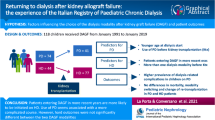Abstract
Purpose
There is a paucity of data on the prognosis for patients returning to peritoneal dialysis (PD) after a failed transplant. PD has an advantage over hemodialysis in preserving residual renal function, which is associated with better outcomes.
Methods
We have reviewed the electronic charts of patients on PD in a tertiary academic hospital for the last 8 years. We have compared technique survival, peritonitis-free survival, and residual diuresis in two groups: patients with graft failure which returned to PD (PD-KTx, N = 18) and patients starting PD for other causes (PD-not KTx, N = 163).
Results
The median follow-up was similar between groups [42(16,71) in PD-not KTx vs. 48(22,90) months in PD-KTx, p = 0.293]. Kaplan–Meier survival comparing PD-KTx and PD-not KTx showed no difference in technique survival (p = 0.196), and peritonitis-free survival (log-rank 0.238), which were confirmed in a fully adjusted Cox regression. Diuresis at baseline and at the end of the first year was similar between groups (p = 0.799 and p = 0.354, respectively). Six out of 18 patients from the PD-KTx group had the immunosuppression maintained and none of those had peritonitis. The reduction of diuresis across the first year of PD was significant for all patients, except for those on continued immunosuppressive therapy.
Conclusion
PD is a worthy dialysis alternative after a failed kidney transplant, providing similar outcomes when compared to patients who started PD for other reasons.

Similar content being viewed by others
Availability of data and materials
Data are available for reviewers and authors for any reasonable reason.
References
Winkelmayer WC, Weinstein MC, Mittleman MA, Glynn RJ, Pliskin JS (2002) Health economic evaluations: the special case of end-stage renal disease treatment. Med Decis Making 22(5):417–430. https://doi.org/10.1177/027298902236927
Budhram B, Sinclair A, Komenda P, Severn M, Sood MM (2020) A comparison of patient-reported outcome measures of quality of life by dialysis modality in the treatment of kidney failure: a systematic review. Can J Kidney Health Dis 7:2054358120957431. https://doi.org/10.1177/2054358120957431
Wong B, Ravani P, Oliver MJ, Holroyd-Leduc J, Venturato L, Garg AX, Quinn RR (2018) Comparison of patient survival between hemodialysis and peritoneal dialysis among patients eligible for both modalities. Am J Kidney Dis 71(3):344–351. https://doi.org/10.1053/j.ajkd.2017.08.028
Tang SCW, Lai KN (2020) Peritoneal dialysis: the ideal bridge from conservative therapy to kidney transplant. J Nephrol 33(6):1189–1194. https://doi.org/10.1007/s40620-020-00787-0
Thiery A, Severac F, Hannedouche T, Couchoud C, Do VH, Tiple A, Bechade C, Sauleau EA, Krummel T, registry R (2018) Survival advantage of planned haemodialysis over peritoneal dialysis: a cohort study. Nephrol Dial Transplant 33(8):1411–1419. https://doi.org/10.1093/ndt/gfy007
da Costa LA, Andreoli MCC, Carvalho AB, Draibe SA, Pestana JOM, Canziani MEF (2020) Clinical outcomes of incident peritoneal dialysis patients coming from kidney transplantation program: a case-control study. PLoS ONE 15(1):e0227870. https://doi.org/10.1371/journal.pone.0227870
Benomar M, Vachey C, Lobbedez T, Henriques J, Ducloux D, Vernerey D, Courivaud C (2019) Peritoneal dialysis after kidney transplant failure: a nationwide matched cohort study from the French Language Peritoneal Dialysis Registry (RDPLF). Nephrol Dial Transplant 34(5):858–863. https://doi.org/10.1093/ndt/gfy290
Smak Gregoor PJ, Zietse R, van Saase JL, op de Hoek CT, IJzermans JN, Lavrijssen AT, de Jong GM, Kramer P, Weimar W (2001) Immunosuppression should be stopped in patients with renal allograft failure. Clin Transplant 15(6):397–401. https://doi.org/10.1034/j.1399-0012.2001.150606.x
Perl J, Bargman JM, Davies SJ, Jassal SV (2008) Clinical outcomes after failed renal transplantation-does dialysis modality matter? Semin Dial 21(3):239–244. https://doi.org/10.1111/j.1525-139X.2008.00441.x
Coronel F, Florit E, Cigarran-Guldris S, Herrero-Calvo JA, Delgado-Cordova M, Rodriguez-Cubillo B (2014) Early kidney transplant failure and return to peritoneal dialysis: preliminary study of permeability and dialysis efficacy. Nefrologia 34(1):105–109. https://doi.org/10.3265/Nefrologia.pre2013.Oct.11732
Acknowledgements
We would like to thank Fatima Libanio for her assistance in retrieving the data from the electronic charts.
Funding
The author(s) RMAM and RME disclosed receipt of support from CNPQ (Conselho Nacional de Desenvolvimento Científico e Tecnológico), grant numbers 303545/2020-8 and 305106/2018-0, respectively). This financial support had no role in study design; collection, analysis, and interpretation of data; writing the report; and the decision to submit the report for publication.
Author information
Authors and Affiliations
Contributions
AGJTM and RME researched literature and conceived the study. AGJTM, GSBB, DDPVRC, and RGR helping collect the data. RME wrote the first draft of the manuscript. LKA, BJP, HA, and RMAM gave important intellectual contributions. All authors reviewed and edited the manuscript and approved the final version of the manuscript.
Corresponding author
Ethics declarations
Conflict of interest
The author declare that they have no conflict of interest.
Ethical approval
Ethical approval for this study was obtained from *Comissão de Ética para análise de projetos de pesquisa – CAPpesq (45163715.4.0000.0068).
Consent to participate
Written informed consent was not obtained from subjects since was waived by the Research Ethical Board.
Consent to publication
Not applicable.
Additional information
Publisher's Note
Springer Nature remains neutral with regard to jurisdictional claims in published maps and institutional affiliations.
Rights and permissions
About this article
Cite this article
Melo, A.G.J.T., Barbosa, G.S.B., V. R. Cortes, D.D.P. et al. Returning to PD after kidney transplant failure is a valuable option. Int Urol Nephrol 54, 1123–1126 (2022). https://doi.org/10.1007/s11255-021-02980-x
Received:
Accepted:
Published:
Issue Date:
DOI: https://doi.org/10.1007/s11255-021-02980-x




